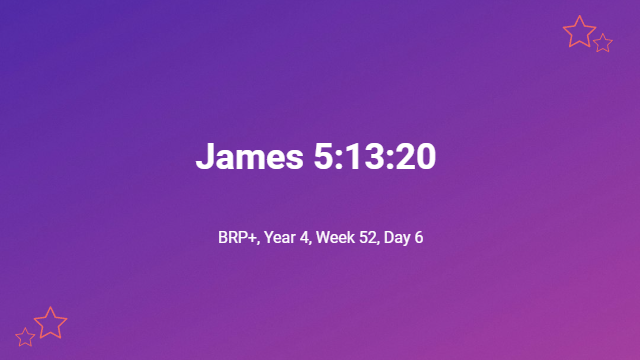James 5:13:20
Q.1. How should we respond to blessing and suffering? What can we expect from the elders’ prayer of faith? – (Jms.5:13-15)
Our first response to suffering should be to offer personal prayer. However, it is much harder to remember to praise God when all goes well. When affected by sickness, we normally turn to the medical profession, whom God has blessed with many advances in treatment. Dr Luke was Paul’s companion on many journeys. Paul urged Timothy to – No longer drink water exclusively but use a little wine for the sake of your stomach and your frequent ailments (1 Tim.5:23). However, in cases where there was no obvious cure, James advised the believers to call for the elders – 14 Is anyone among you sick? Then he must call for the elders of the church and they are to pray over him, anointing him with oil in the name of the Lord; 15 and the prayer offered in faith will restore the one who is sick, and the Lord will raise him up, and if he has committed sins, they will be forgiven him (Jms.5:14-15). The context seems to imply that the sickness that James was addressing was related to sin. The word used for ‘restore’ is also translated ‘made whole’ or ‘saved’. For the elders to offer a ‘prayer of faith’, that would imply a belief that God would intervene. The case of Timothy, as referred to above, suggested that healing was not always the outcome, even though Paul had been used by God to bring healing in his earlier ministry (Acts 14:8-10; 19:11-12).
Q.2. How do we know that the prayer of the righteous can make a huge difference? – (Jms.5:16-18)
Verse 16 connects to what comes before and after. It starts – Therefore, confess your sins to one another, and pray for one another so that you may be healed. The effective prayer of a righteous man can accomplish much (Jms.5:16). The ‘therefore’ connects it to James’s comments on the elders’ intervention, with their prayer of faith for the sick, as stated in verses 14-15. It seems to qualify what James had to say by drawing attention to the confession of sin by the sick person who was seeking wholeness. This lines up with the role given to the church leadership by Jesus in Matthew 18:18 & John 21:23 – If you forgive the sins of any, their sins have been forgiven them; if you retain the sins of any, they have been retained. James gave the example of the prophet Elijah, who at God’s bidding, ushered in a three and a half year drought. Then, in a public display of God’s power before King Ahab and hundreds of false prophets, he foretold the breaking of the drought (1 Kgs.17:1; 18:36-46). To inspire believing prayer, James informed us that – the effective prayer of a righteous man can accomplish much (Jms.5:16). The context suggests this application is in the spiritual realm – confess your sins to one another and pray for one another so that you may be healed (Jms.5:16).
Q.3. What did James mean by “straying from the faith”? What responsibility do we have regarding backsliders? How significant is ministry to those in error? – (Jms.5:19-20)
James was not just speaking about people who drift from the faith through trials or the deceitfulness of riches. He was discussing those who ‘stray from the truth’ and had fallen into error doctrinally. This person was in danger of losing his soul through a false gospel (Jms.5:19-20 c.f. Gal.1:6-9; 3:1-5). We have a responsibility to – … turn(s) a sinner from the error of his way will save his soul from death and will cover a multitude of sins (Jms.5:20 c.f. Jude 22-23). Such ministry can be the difference between life and death eternally.

